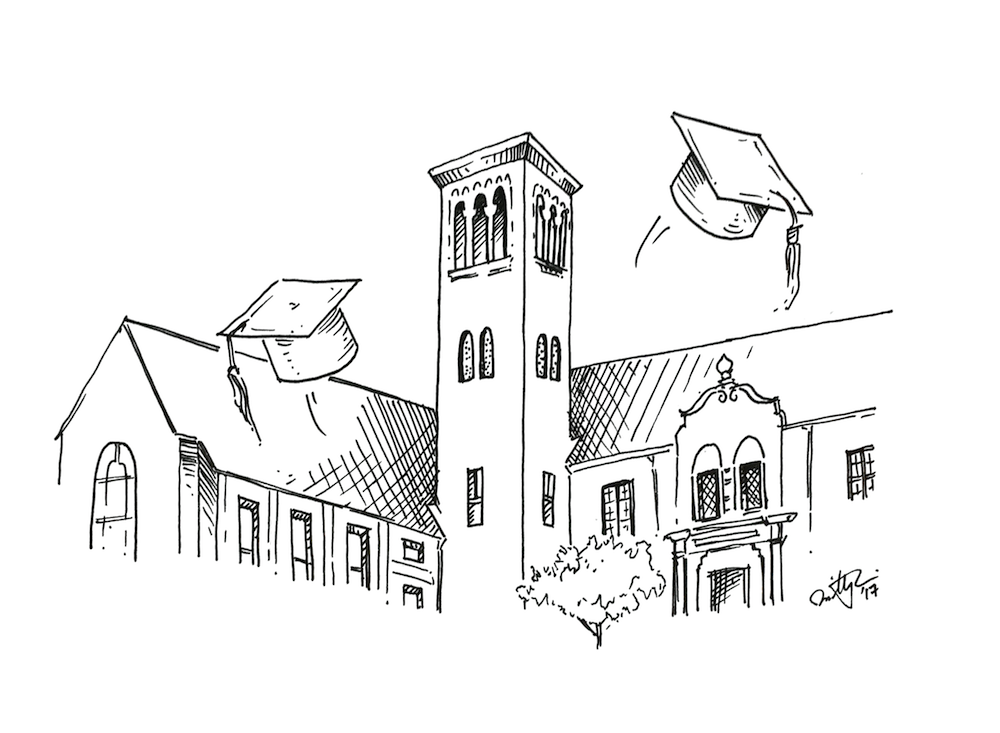“College?” – It’s the perpetual question asked to high school seniors at this time of year throughout the country.
Some students have been committed to their dream schools for months, some just committed yesterday and some are planning their productive gap years, but all know that this is the end of an era, and the beginning of the next.
As the end of the school year approaches and decision day rolls around, many Palo Alto High School seniors are reflecting on their high school experiences. Here is some advice from those who know the most on how to get through it all: college counselors and teacher advisers.

Classes: Finding the line between challenging and too much to handle.
It is important to challenge yourself academically during high school, but challenge does not mean overload, according teacher adviser advisory presentations. Try to spread out taking difficult classes between your junior and senior years so neither has an excessive amount going on.
Most students don’t have private college counselors helping them choose classes, so feel free to ask older kids and teachers on campus — and especially your adviser in the College and Career Center — for advice when signing up for classes and getting to know which classes and teachers will be the best fit for you. Paly college counselor Sandra Cernobori says that underclassmen often come talk to her about class choices, and that taking the highest lane of classes will not determine your future success. She says that taking classes that require a lot of homework or are known for being difficult may be appropriate for some students, but not for others; find out what works for you.
“People get into college with Algebra 2 as their senior math class,” Cernobori said. “Just because your friend is taking a lot of AP classes does not mean that that’s the right thing for you to do.”
Take a chance and sign up for electives that you are interested in, even if they might not look as impressive on your transcript, Cernobori says. That’s probably the best reason to take a class — to learn about something you care about.
College applications and decisions: Prepare for the worst, but hope for the best.
If there’s anything that the Class of 2017 has learned, it’s this: apply to safety schools that you would actually want to go to, because you might actually end up going there. Sometimes admissions decisions don’t go your way, like many seniors faced this year (shoutout to the UC’s), so you may be left with very few choices on where to go to college. Cernobori says that making sure that schools that you are likely to be accepted to do not go straight to the back burner is vital, and that visiting them should be made a priority.
“In our office, we’ve tried to shift the language from ‘safety’ to ‘likely’ to emphasize that the category is really about the admissions process as opposed to it being a back-up plan,” Cernobori said. “All of the schools on your list should be ones that you would be willing to go to, and should have things in common with other schools you apply to, and you have to do your research to vet that out.”
Starting to work on your college applications early on is a good idea, Cernobori says. The summer before senior year is a great time to start writing your common application and University of California essays, and will reduce stress during the school year. Make sure you know everything you need to apply and have everything squared away ahead of time so that any technical difficulties won’t affect your admissions. Following your Viking Guide is a great way to make sure that you’re organized and take care of everything.
Cernobori echoed these sentiments.
“Often, I tell students that if they have time, they should begin brainstorming during the summer,” Cernobori said. “I don’t care if they don’t write them, I just want you to think about it.”
As the guide points out, planning your life after high school falls mostly on the student, but “there are many people and places at Paly to help you on your way.”
When you start getting decision emails, prepare yourself. Getting rejection letters isn’t fun, but it is part of the process, and that’s okay. You are not alone in that, even if it may feel like you are. If you’re feeling down, get together with a group of friends, read a good book or eat some ice cream.
Cernobori encourages students and parents alike to be cautious and nonjudgemental when approaching the subject of college.
“People should be really sensitive to other’s feelings and I don’t think this should be a topic for conversation,” Cernobori said. “Students are under enough stress trying to do this reflection and the work of the applications without [other] students talking about their choices. I would extend that advice to parents a lot — I feel for kids when you run into someone at Safeway and the first thing that they ask you is ‘College?'”
As the Paly College and Career Center advocates, community college is also another option that may be suitable to many students.
Congratulations to the Class of 2017 for all of the things that you have accomplished and for everything that’s coming in the future. And to the Classes of 2018, 19, 20: make sure that you have fun while you’re here, because your teenage ignorance can only last so long. Enjoy it!

